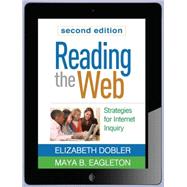Today's students need to know how to locate, comprehend, evaluate, and use online information efficiently and effectively. This widely used teacher guide and course text provides a framework for maximizing students' critical, creative use of the Web in grades 3-8. Research-based strategies for instruction and assessment across the content areas are clearly explained and linked to the Common Core State Standards (CCSS). In a large-size format for easy photocopying, the book is packed with graphics, sidebars, lesson plans, and more than 90 reproducible handouts. Purchasers get access to a Web page where they can download and print the reproducible materials.
New to This Edition
*Incorporates state-of-the-art research and Web resources.
*Chapter on major Web 3.0 developments, such as the rise of social media and mobile devices.
*Connections to the CCSS are identified throughout.
*Stronger focus on Universal Design for Learning and differentiated instruction.
*Larger format facilitates photocopying of the updated reproducible tools.
New to This Edition
*Incorporates state-of-the-art research and Web resources.
*Chapter on major Web 3.0 developments, such as the rise of social media and mobile devices.
*Connections to the CCSS are identified throughout.
*Stronger focus on Universal Design for Learning and differentiated instruction.
*Larger format facilitates photocopying of the updated reproducible tools.








